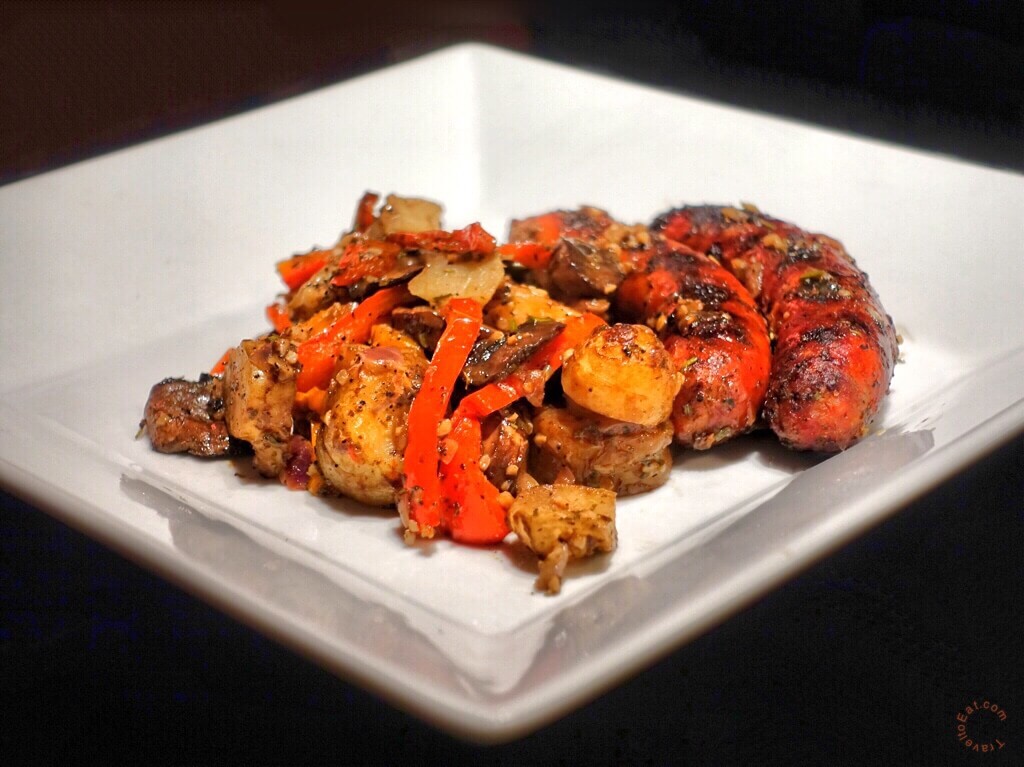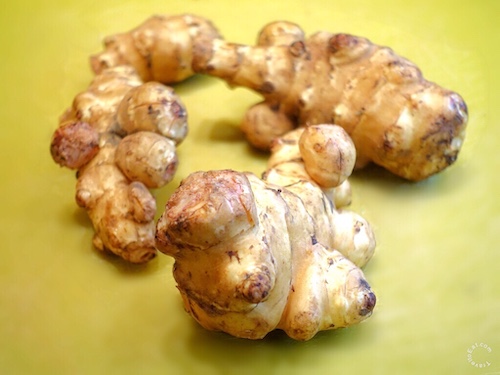
It is the middle of winter and if you are like me, you are looking for ways to infuse a little imagination into the menu. I have decided to post on the Jerusalem Artichoke or Sunchoke, that gnarly little root vegetable you have seen in the produce isle, but probably knew little about. Take it from me, they are delicious, cooked a little “al dente” they taste nutty and a little bit like an actual artichoke heart crossed with a potato. Jerusalem artichokes, also known as sunchokes, are a knobby root, similar in appearance to ginger. They are nutty, crunchy and taste remarkably similar to the artichoke, but they are available for a much cheaper price and in the dead of winter. But unlike the potato, they contain little starch and have a nice serving of inulin and vitamin C. A Jerusalem artichoke’s best friends are sage, thyme, butter, bacon, bay, cream, breadcrumbs, cheese and anything smoked. It was said that all newly discovered plants were sent to the Pope where he would give them to his friends to cultivate, one of which was Cardinal Farnese who was growing Jerusalem artichokes in 1617 in Rome.
Introduction:
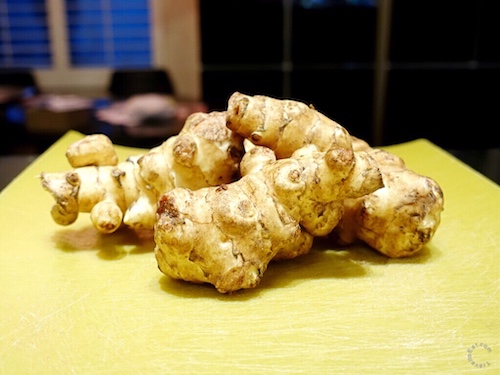
You can cook Sunchokes by boiling, roasting or frying. You can skin them or keep the skin, personally I like the skin and it saves a step. Since they are a tuber, if you don't peel them, you should at least scrub them vigorously under cold water to remove dirt and grit. For this recipe, scrub them and cut into half inch chunks. From this point you can toss them in olive oil or butter and roast them for 30-45 minutes. In this case I chose to steam them for 20-30 minutes, and then fry them, to give a crispy exterior. Sunchokes are a great source of iron, potassium and thiamin. A 1-cup serving of sliced, raw Jerusalem artichokes contains 110 calories, 3 grams of protein and 26.2 grams of carbohydrates, including 2.4 grams of fiber, or 25 percent of the daily value. One further thing you should know about Sunchokes is their English nickname, the “fartichoke”. The vegetable is made of a carbohydrate called inulin, instead of the tuber’s typical starch, and inulin has a mild laxative-like effect on the human digestive system, we can’t digest it naturally, so our gut bacteria go to town. I have not had a problem with it when cooked as a compliment to other veggies but you might not want to serve a large bowl of raw Sunchokes to your dinner guests.
Ingredients:
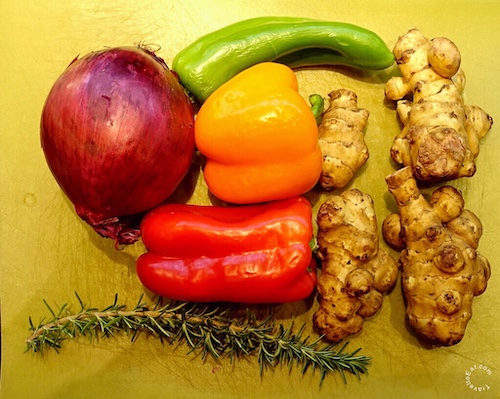
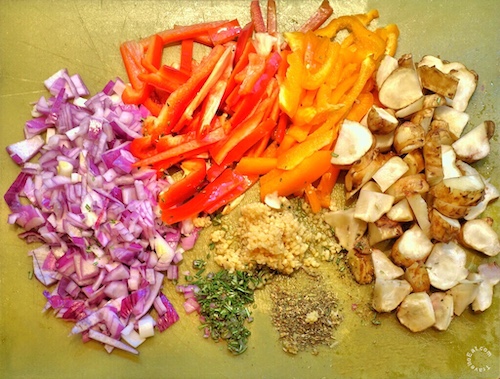
One diced red onion
One red pepper cut lengthwise
One yellow pepper cut lengthwise
One Anaheim pepper finely diced Rosemary, one sprig finely diced
Thyme one teaspoon
Diced garlic to taste Salt to taste
Baby sliced Portabello mushrooms one cup
Instructions:
Scrub the Sunchokes vigorously and chop them into 1/2 inch bites. Place them in the steamer basket for 30 minutes. Transfer to a skillet with olive oil, along with the rosemary, thyme salt and pepper and brown the Sunchokes over medium heat for 10-15 minutes. As an alternative you can toss the Sunchokes in oil, salt, herbs and garlic powder and roast them for 45 minutes to an hour at 350 degrees. Cooking them well will decrease any potential gastrointestinal discomfort, plus I like them with a crisp exterior and creamy interior. I have Rosemary growing year-round in my yard, just remember that it is a strongly flavored herb.
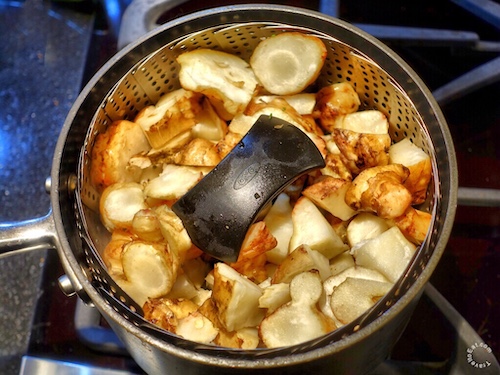
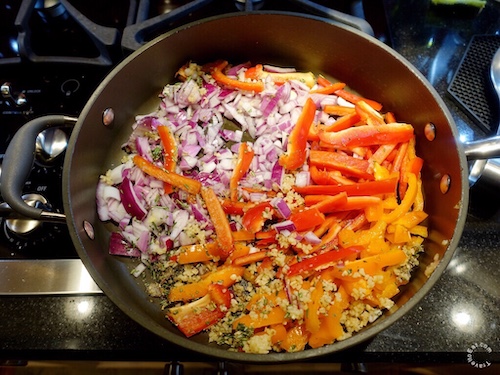
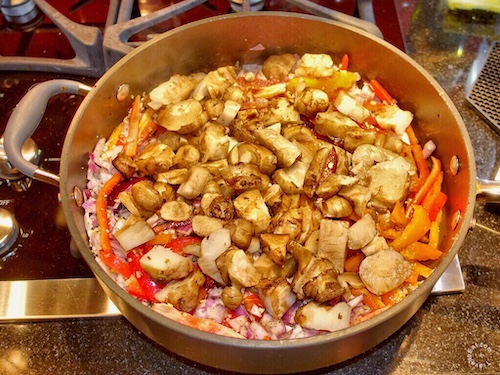
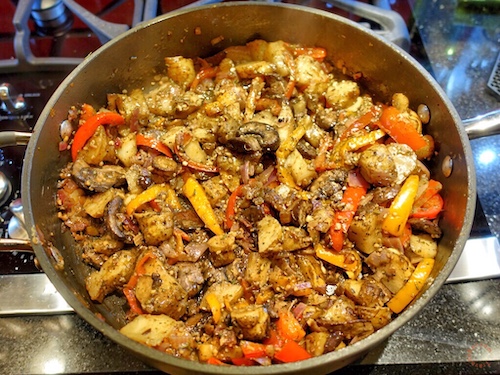
Reduce the heat and add vegetables, onions, peppers, garlic, herbs and salt to taste. Cook on low heat until the onions begin to soften and add the baby Portabello mushrooms, which hold up well to heat. Cover and cook for 10-15 minutes.
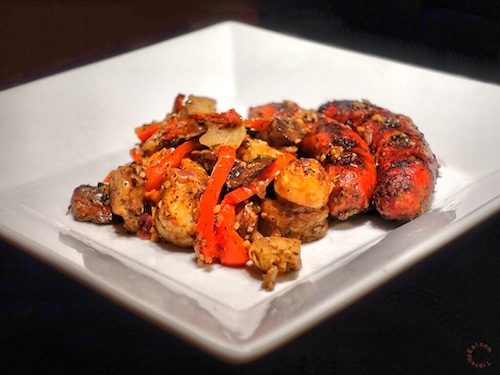
I paired my Sunchoke “antipasto” with two grilled turkey sausages each for myself and Lisa. This was a delicious and fresh meal in the middle of winter with the fresh taste of “out of season” artichokes. Next time you visit the supermarket, consider adding Sunchokes to your cart for a change of taste. As always, please leave a comment.
References:
Jeruselum Artichokes: http://www.specialtyproduce.com/produce/Sunchokes_2023.php
Sunchokes: http://www.livestrong.com/article/38645-sunchoke-nutrition-information/
Sunchoke: http://www.huffingtonpost.com/2012/02/01/cooking-jerusalem-artichokes_n_1247522.html
Jamie Oliver: http://www.jamieoliver.com/recipes/vegetables-recipes/saut-ed-jerusalem-artichokes-with-garlic-and-bay-leaves/
Health Benefits: http://www.livestrong.com/article/374796-health-benefits-of-jerusalem-artichokes/
The Dark Side of Sunchokes: http://www.bonappetit.com/columns/the-foodist/article/do-jerusalem-artichokes-cause-diarrhea

